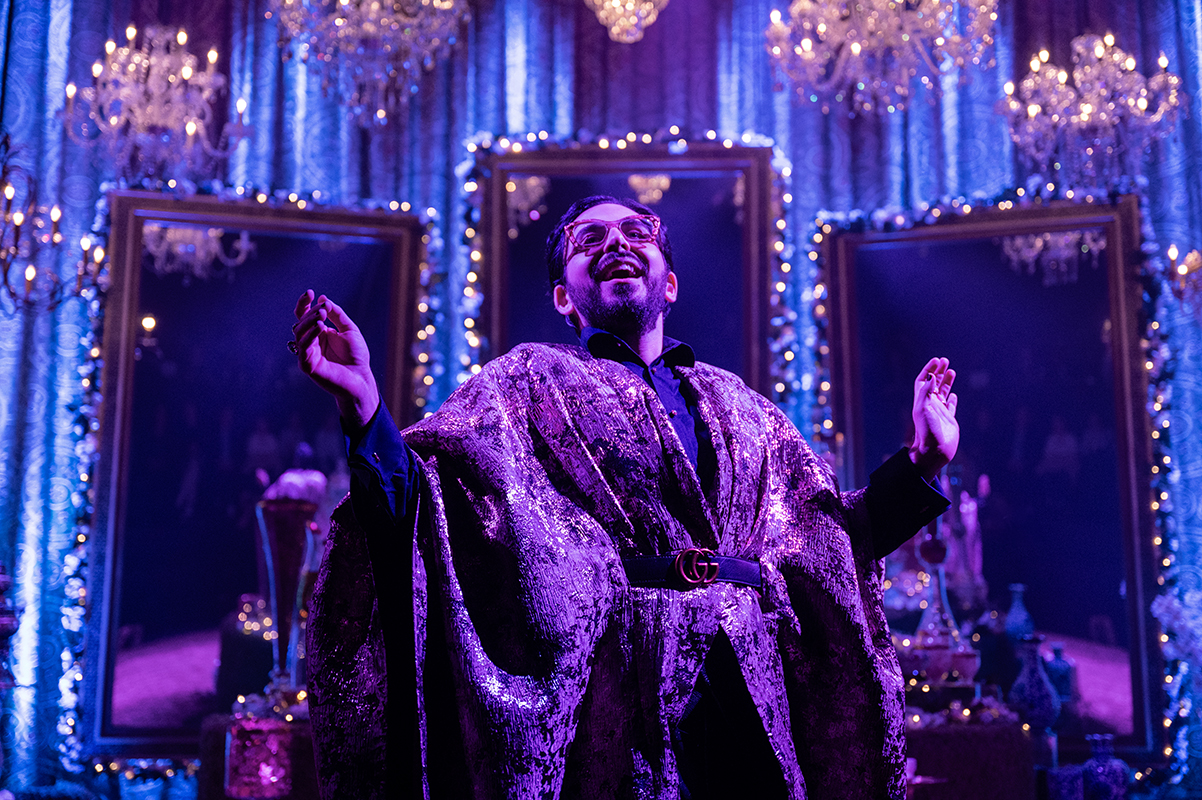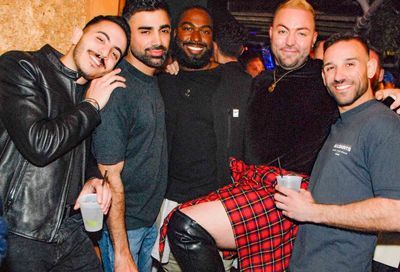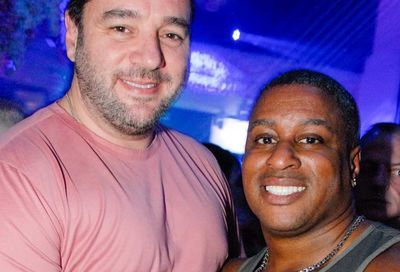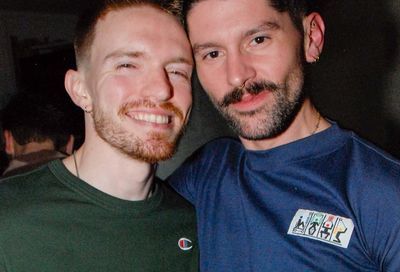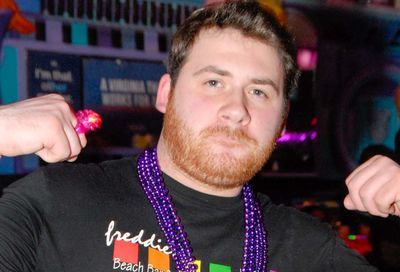Guardian Angel: Tony Kushner
Two decades after his magnum opus "Angels in America," Tony Kushner continues to expound on gay topics
Tony Kushner has been heralded as a leading playwright of our time. But the preeminent gay thinker hasn’t intently, explicitly explored gay issues in over two decades.
“I felt like it was time to write a play that had something to do with being gay,” says Kushner about his latest work, The Intelligent Homosexual’s Guide to Capitalism and Socialism with a Key to the Scriptures, now being staged in a new production at Theater J. “I haven’t really addressed the subject directly since Angels.”

Illustration by Christopher Cunetto
By Angels, of course, he means his seminal epic Angels in America: A Gay Fantasia on National Themes. First staged on Broadway in 1993, the two-part series won him back-to-back Tony Awards for Best Play as well as a Pulitzer Prize — and a decade later, after Kushner worked with director Mike Nichols to adapt it for HBO, the miniseries earned multiple Emmy and Golden Globe awards. Kushner has had success on stage since Angels, most notably with 2001’s Homebody/Kabul and the 2004 musical Caroline, or Change, which he wrote with composer Jeanine Tesori. In the past decade he’s gained still wider exposure for his work on film with Steven Spielberg, garnering two Oscar nominations for best screenplay, for 2005’s Munich and 2012’s Lincoln.
Yet, there remains something particularly indelible about Angels in America. A former Metro Weekly critic called it “one of the most important pieces of theater to come out of the late 20th century.” It’s certainly had an outsized impact on culture. To take the most recent signifier, three of this year’s Out100 specifically cited Angels as inspiring their careers to become out and proud creators in New York.
In addition to exploring the intertwined topics of gay rights and the fight against AIDS, Angels touched generally on progressive politics in America — the driving force behind most of Kushner’s works. That’s especially true with The Intelligent Homosexual’s Guide. The full title, adapted from works by George Bernard Shaw as well as Christian Science founder Mary Baker Eddy, makes this play, staged Off-Broadway in 2011, sound gayer than it actually is. The focus is on a liberal family reunited on the occasion of the patriarch’s impending death by suicide. Though one of his sons is gay, much to the father’s consternation, it’s the rights of laborers more than gays that is put under the microscope. After last decade’s New York stage workers strike, Kushner was appalled by “the anti-union sentiment that I was hearing from a lot of people in the theater world, many of whom I believed and I think believed themselves to be progressive people…. It brought home forcefully how pervasive the anti-labor politics of Reaganism has become in American thinking.”
Kushner was inspired to write The Intelligent Homosexual’s Guide as a “family drama” in the mold of Eugene O’Neill and especially Arthur Miller. His own family, which includes a sister and a brother, also helped shape the piece. Unlike the play’s patriarch Gus, Kushner’s father was “sweet and gentle,” he wasn’t a labor organizer and he didn’t commit suicide. He did, however, struggle for years with the homosexuality of his eldest son, who in turn struggled with his death from kidney disease.
“I had already lost one parent and I knew how tough it was going to be to lose him,” Kushner says. “He died in 2011, after the play was written. But I think it is in a way a play about his death.”
METRO WEEKLY: I know the outlines of your upbringing — born in New York, reared in Louisiana, to parents who were both classical musicians. Did you ever think to follow in their footsteps? And how did you get turned on to the theater in the first place?
TONY KUSHNER: The only thing I do musically is write lyrics for musicals with Jeanine Tesori. My brother, who is five years younger than me, is the first horn of the Vienna Symphonica. And my sister is a painter. So she and I didn’t go into music. When we moved to Louisiana, my mother was a really great bassoonist. She was one of the first women to have a principal chair at a major orchestra in America. She recorded with Stravinsky, and was a really extraordinary musician. We moved to Lake Charles, Louisiana, which is where my father was from, I think because of economic insecurities. My father wasn’t sure he’d be able to make a living as a clarinetist, enough to support a family. My father joined my grandfather in the local lumber business. He also became a conductor of two really wonderful symphony orchestras in Lake Charles and in Alexandria, Louisiana.
And my mother, who was a very expressive person, needed an outlet for her rather formidable creative energies. She played the bassoon with the symphony and she taught bassoon and oboe at the local college, but I think she needed something more. So she started acting when I was about four years old. The most important memory that I have of her is on stage — she was a really, really wonderful actor, I think. She played Linda Loman in Death of a Salesman. I remember very, very vividly watching her on stage during that play. I didn’t understand what the play was about, but I had a strong sense that I was seeing something that was moving people and that was more serious and more important somehow than the other things I’d seen. It was staged in the round in an old Army barracks in Lake Charles. I could look across the acting space and I remember seeing my mother’s best friend sobbing, and there were even men in the audience who were sobbing. I was awestruck by the power and scariness of it. And I’m pretty sure that’s why I got interested in theater.
My parents were both big readers. My father was a great reader. He memorized a lot of poetry. He paid us a dollar for every poem we could memorize. He had an astonishing memory. In a way, becoming a playwright was a joining of my father’s love of literature and poetry and my mother’s enormous expressiveness on stage and acting. And even, in a way, it’s music. Playwriting isn’t a musical form exactly, but it has a lot to do with sounds and with the effects of sound on the ear.
MW: How did your parents take to your coming out?
KUSHNER: I had a lot of trouble with my father growing up because of being gay. He kind of figured out pretty early on that I was not straight, and was very determined to see that change, one way or another. He was very unhappy about it. I think he felt a rejection of himself. And I think he was just frightened by that, as were others in his generation. As far as he knew, if I was gay, I would grow up to be one of those sad guys who were lonely and occasionally arrested in the men’s room at the bus station. It happened to a couple of my teachers in Lake Charles. So we struggled a lot. He sent me to various therapists, he tried scaring me into heterosexuality by telling me he would reject me. I don’t think I ever really completely believed that he would, and I don’t think he would have. But he was pretty rough about it at times.
MW: Is it true your mother cried for months about your being gay?
KUSHNER: Well, not nonstop. But when we talked she would usually start crying until I just couldn’t stand it anymore, and said, “I’m not going to talk to you anymore until you stop it.” It was very hard for her. When Angels started to get national attention — when it was in the very early days, just being done in workshops in L.A., there was a big article about me in the Los Angeles Times, and somebody in L.A. sent it to his mother in Lake Charles, and his mother brought it to my mother — she sort of began realizing that the secret was about to be out. I came out pretty much to everybody at that point. And I told my parents, “I’m not going to be in the closet when I talk about myself. I’m not going to hide this.” In between my coming out and that moment, I had a boyfriend who I had brought to Lake Charles, and she was absolutely wonderful to him. She was an incredibly loving, wonderful person. We lived together for four years, and she would talk to him on the phone, and she would send him presents. But she was still fighting it — she was still frightened about it.
She had breast cancer when I was 11, but it came back 20 years later and metastasized into lung cancer. She died in 1990 just as the play was beginning to take off. I know she would have come to a complete acceptance with time. It’s always been a source of pain to me that she didn’t really have that. I’m really glad that by the time she died she knew who I was.
My father and I had another almost 20 years after that to really repair a lot of the damage that the struggles of my childhood had done. When I started to get a name, and especially when he read the first draft of the first half of Angels, his resistance just collapsed. And he said, “This is who you are, and I’m not fighting it anymore.” And he became very quickly very, very supportive. He was never a particularly political person, but he would not let anyone say anything bad about gay people in his presence. And in Lake Charles, Louisiana, that was a feat. It’s a very reactionary part of the country. After Mark and I got married and were in the Vows column in the New York Times, and my father was in a picture that they ran, a cousin who was my father’s age came up to him and said, “Well Bill, I saw that picture in the New York Times. You certainly looked pretty miserable.” And my father said, “As a matter of fact, it was one of the happiest days of my life.” And then he walked away and he never spoke to the guy again.
MW: I’m gathering you didn’t exactly get your progressive politics from your parents.
KUSHNER: For the most part, yeah. I was a Jew in small-town Louisiana — that taught me a certain amount about being “other.” We didn’t experience a lot of particularly virulent anti-Semitism, but we experienced some. And we were certainly a very skilled minority, and attracted attention as a small minority. And my parents said from day one, “Be proud of being Jewish, never try and hide it. If anybody has a problem with it, it’s their problem, it’s not your problem. You have nothing to be ashamed of or apologize for.” And it was a perfect model for coming out. And I used it mercilessly with my parents when I did. I said, “I know how to be gay because you taught me how to be Jewish in southern Louisiana. And what applies to Jews applies to gay people — don’t apologize. It’s not our problem, it’s the homophobic world’s problems.”
My mother was sort of very emotional, and I think a left-leaning progressive person. My father was much more moderate, but he was a liberal. And a person who believed in fairness and justice. And he maintained that the rest of his life. My grandfather also was a profoundly decent man. He had a lumberyard, one of the first businesses in Lake Charles that catered to an African-American clientele. He dealt very fairly with people and very humanely with people who were having economic difficulties. And I think he passed that along to my father. So I don’t come by my politics from any particularly remarkable source. I think just from some ordinary, decent Americans who believed in democracy and believed in human rights and civil rights and justice.
I was in high school in the early 1970s, and our high school, the main high school in Lake Charles, was integrated by federal mandate. And it went from being an all-white school to a 50-percent black/50-percent white high school in my sophomore year. And it worked. Everybody expected violence and terribleness and whatever kind of fantasies they had. But nothing like that happened. There were some tensions obviously, but people got used to being together fairly quickly. And I saw people cross-pollinating, teaching each other things that were of great value. I learned things of great value from African-American friends that I had in high school. And I really believe that I received an absolutely incandescent example of social engineering at its best. And then, of course, the white people of Lake Charles passed a bond issue to build a huge high school far away from any place that any African-American student could conceivably be bussed and destroyed it. They ruined what was begun, what was just the flowering of the civil rights movement — in the late ’60s and definitely ’70s when the country was really committed to trying to experiment in fairly daring ways, trying to create a new kind of America. And then it got abandoned. But I’ll never forget the lessons from the successes.
Support Metro Weekly’s Journalism
These are challenging times for news organizations. And yet it’s crucial we stay active and provide vital resources and information to both our local readers and the world. So won’t you please take a moment and consider supporting Metro Weekly with a membership? For as little as $5 a month, you can help ensure Metro Weekly magazine and MetroWeekly.com remain free, viable resources as we provide the best, most diverse, culturally-resonant LGBTQ coverage in both the D.C. region and around the world. Memberships come with exclusive perks and discounts, your own personal digital delivery of each week’s magazine (and an archive), access to our Member's Lounge when it launches this fall, and exclusive members-only items like Metro Weekly Membership Mugs and Tote Bags! Check out all our membership levels here and please join us today!






